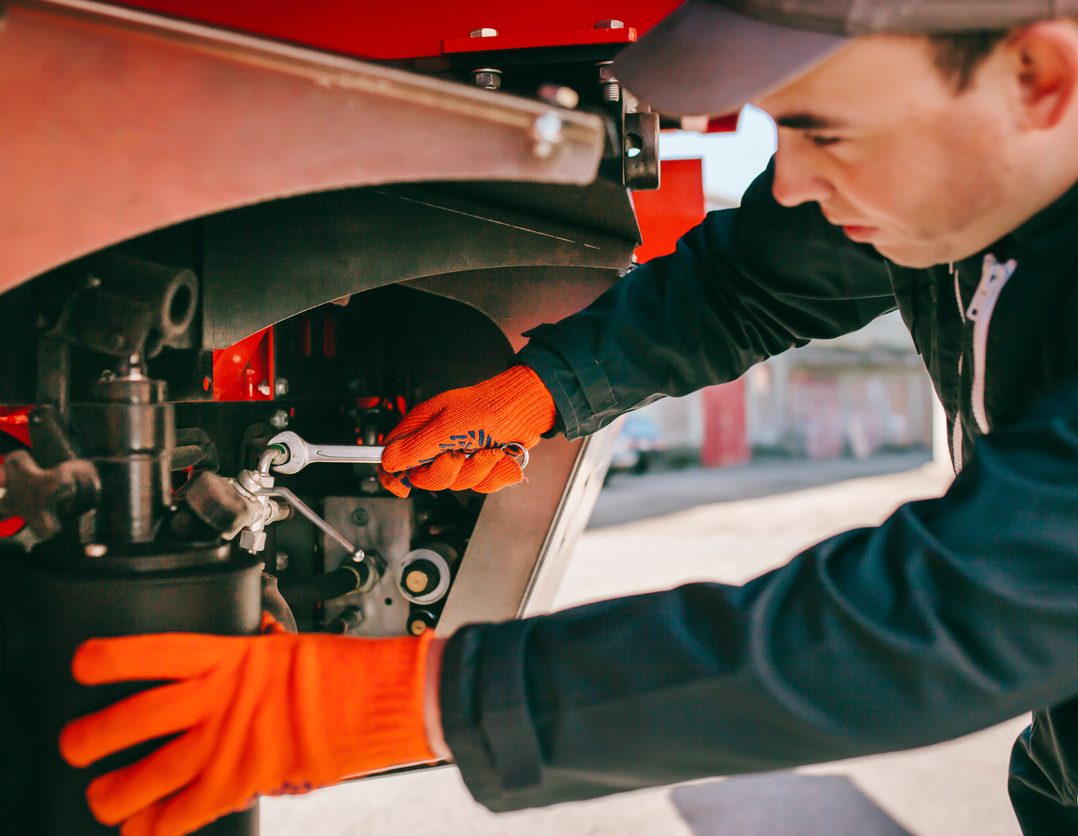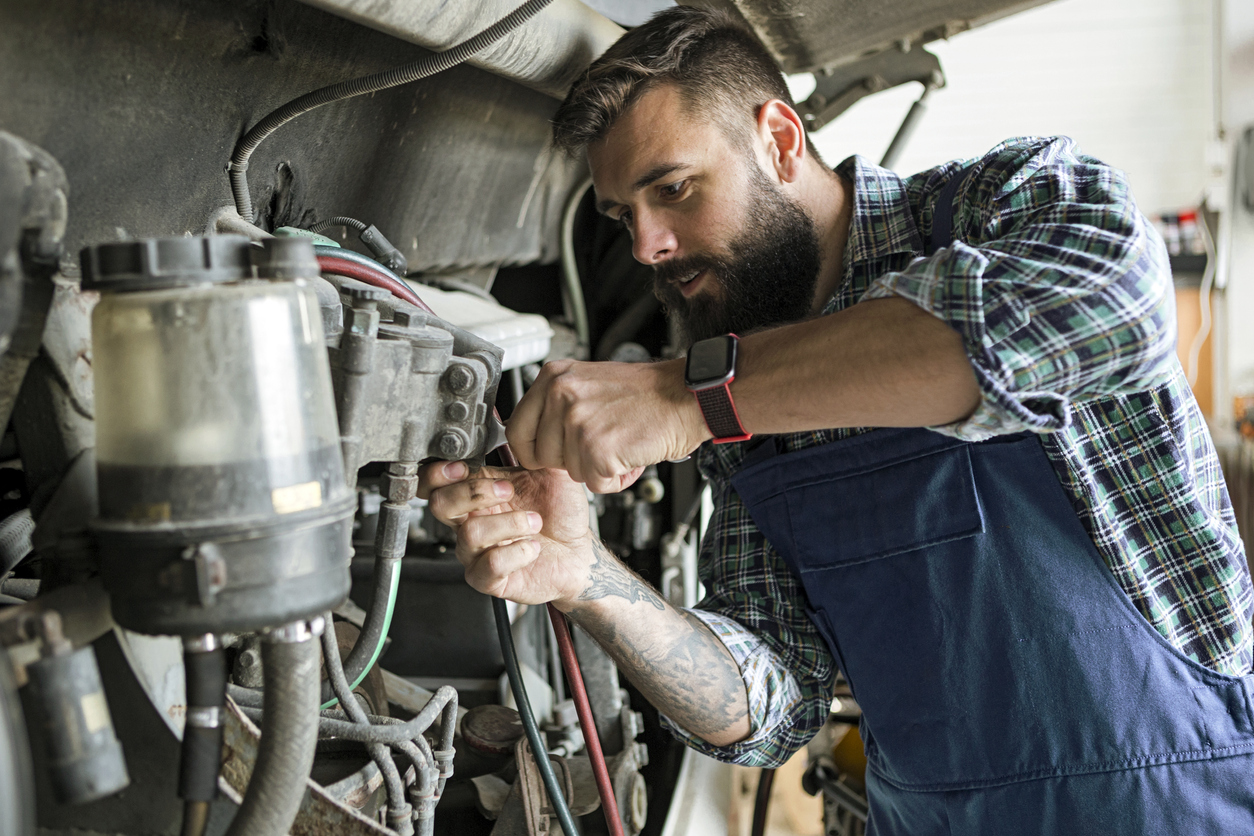DOT Inspections – Mobile, On-Site
By Certified Diesel Mechanics
At Your Location
NEW
CUSTOMERS
Half Off
Only $95.00
(Limit 3)
Save Time and Money with Our
Convenient Hassle-Free Service.
We can do all repairs needed to pass your
DOT inspection and keep your trucks safe,
compliant, and road-ready.
Meeting Regulatory and Internal Inspection Standards
Mobile Wrench provides on-site mobile inspections for commercial trucks, trailers and equipment to keep you in compliance with federal and state regulatory requirements. We also perform inspections to comply with company-specific requirements that go beyond these regulatory standards. We’ll complete and provide all the paperwork and stickering related to all inspections.
Our Services
Mobile Wrench performs a wide range of services as part of our DOT inspections.
DOT Inspections
Contact Mobile Wrench to schedule your mobile, on-site, annual DOT inspections for your trucks and trailers. Our expert diesel mechanics will examine every element included in the DOT standards and they’re prepared to repair most failures or deficiencies on the spot.
ANSI Bucket, Boom & Crane Inspections
Mobile Wrench provides on-site American National Standards Institute (ANSI) inspections to comply with OSHA regulations for truck-mounted buckets, booms and cranes. These important inspections cover the key safety and functional elements of this equipment, including structural soundness, electronics and hydraulics.
Company-Mandated/Proprietary Inspections
Companies often have mandatory truck or trailer and equipment inspection that meet or exceed the standards of annual DOT or ANSI requirements. Mobile Wrench provides on-site, mobile inspections for companies with these kinds of proprietary, internally mandated inspection programs.
Liftgate Inspections
Liftgates are an essential element of many commercial delivery vehicles. If they aren’t operable, the truck is out of commission. Mobile Wrench offers scheduled, on-site mobile inspections of liftgates, evaluating their working components, switches, mechanical elements and electrical components to identify possible failure points of liftgates in advance…to avoid downtime.
Pre-Purchase Inspections
Before you commit to buying an expensive commercial truck, have Mobile Wrench’s highly qualified diesel mechanics thoroughly inspect the equipment. We will assess its compliance with DOT inspection regulations, use a computer scanner to evaluate codes and sensor issues, evaluate additional systems such as heating, electrical, air conditioning, body work, interior cab and more. We will provide a complete report of all findings to help you make an informed decision.
VK Inspections for Bobtails
Mobile Wrench provides VK inspection services for companies operating bobtail trucks and propane trailers. Annual VK propane bobtail inspections are important for safety, efficiency, and legal compliance, ensuring the propane tank can hold pressurized gas without leaks or failure. The “VK” refers to the Visual inspection (V) and Leakage test (K) required by the Department of Transportation (DOT) to check for structural integrity, cracks, corrosion, and potential leaks annually or before the tank is put into service.

What Can You Expect from a DOT Inspection?
DOT l inspections are required annually for most commercial vehicles. It is a comprehensive check of the vehicle’s systems to make sure it is safe to operate on the nation’s highways. The inspection involves many aspects of the vehicle’s operation. Inspections likely take more than an hour, sometimes much more, though they can be shorter.
Below is a rundown on the different areas of the inspection and what they cover:
Brakes
Inspectors will make sure the brake systems are functioning properly. They will measure the brake pads or shoes and the rotors or drums to ensure they are at safe specifications. They will look for missing, non-functioning, loose, or damaged parts. They’ll also inspect and test for air leaks and verify that the air chambers on all axles are the same size. They’ll look for holes caused by rust or friction and verify the brake system maintains proper pressure, measure the pushrod travel, and make sure that none of the brake system warning lights are on.
Coupling Devices
For all trailer trucks, inspectors will look at the coupling devices between the cab and the trailer, with special focus on the fifth wheel coupler. They’ll make sure that the fifth wheel is in proper working condition without significant wear or damaged parts. They will also make sure that it is engaged properly.
Fuel and Exhaust Systems
Inspection will include looking for loose mounting of the fuel tank and make sure the fuel tank cap is present and secure. It will make sure the exhaust system is secured and isn’t leaking. Inspection will look for carbon deposits around seams and clamps, which can indicate leaks. Inspection will also verify that none of the exhaust system components are in contact with wiring or brake lines – hot exhaust pipes can melt these.
Lighting
There are dozens of lights required for operating on the highway. These are easy to inspect and repair, but not having operating lights is one of the most common out-of-service (OOS) violations.
Steering
Diesel mechanics inspect the steering wheel to make sure it’s secure, and that it locks into place properly despite telescoping and tilt functions. The inspection will look for cracks and welds in the steering components and make sure that all the components are secure. Inspectors also check the amount of play (also known as lash) in the steering wheel. The amount allowed depends on the size of the wheel.
Suspension
Inspection looks at the springs to make sure they are all present and not misaligned, shifted, or cracked. It will look for loose shackles or u bolts, as well as missing bolts and unsecured spring hangers. Inspection also checks for axle misalignment and any cracks or welds.
Tires, Wheels, Rims, and Hubs
Inspection will make sure the tires are properly inflated, aren’t worn down too much, aren’t otherwise damaged, and are appropriate for their placement. Inspection also looks at the wheels, rims, and hubs to make sure they are properly secured and not damaged or worn.
Securement of Cargo
At a roadside inspection, inspectors will look at how the cargo is secured to make sure it won’t come loose. Annual inspections should check cargo securement equipment, including the rear doors and tiedown anchors.
Frame, Van, and Open-Top Trailers
Inspection will look for corrosion fatigue and cracks in the frame, as well as general signs of sagging in the frame. It will look at all the axles, hoses, and check for any missing or defective parts.
How Often Are DOT Inspections Required?
Department of Transportation (DOT) inspections are required at least annually for many commercial vehicles. This includes:
- Commercial motor vehicles that weigh over 10,000 pounds
- Vehicles that transport more than 16 passengers (including the driver)
- Any vehicle that transports hazardous materials
- Passenger-for-fee and school busses (even if they carry fewer than 16 passengers)
This should be documented – failure to carry documentation of annual inspections can lead to fines.
Be aware that regulations also require commercial fleet operators to perform daily pre and post trip inspections. These inspections, known as Daily Vehicle Inspections Reports (DVR’s), are not as thorough as annual DOT inspections performed by qualified diesel mechanics.

Why Choose Mobile Wrench
Mobile Wrench provides mobile inspection services, which means that they can come to your site and inspect your vehicles there. Our mechanics are highly qualified. They are certified to perform the inspection, and they can perform most failure repairs the same day. We’ve been providing quality on-site maintenance and vehicle inspections since January 2000.
We work with vehicles in many industries, so we can perform inspections of more than just the basics – we can look at specialized equipment and make sure it is meeting appropriate standards.
Contact us today to schedule an appointment. Mobile Wrench serves customers in the Denver metro area, Northern Colorado and Colorado Springs.
Mobile Wrench provides mobile inspection services, which means that they can come to your site and inspect your vehicles there. Our mechanics are highly qualified. They are certified to perform the inspection, and they can perform most failure repairs the same day. We’ve been providing quality on-site maintenance and vehicle inspections since January 2000.
We work with vehicles in many industries, so we can perform inspections of more than just the basics – we can look at specialized equipment and make sure it is meeting appropriate standards.
Contact us today to schedule an appointment. Mobile Wrench serves customers in the Denver metro area, Northern Colorado and Colorado Springs.
Frequently Asked Questions About DOT Inspection
Does my vehicle need a DOT inspection?
Most commercial vehicles need to pass DOT inspections. This includes vehicles that:
- Weigh over 10,000 pounds
- Transport more than 16 passengers (including the driver)
- Carry hazardous materials
- Transport school children
- Carry passengers for a fee
Vehicles that are required to have inspections are also required to carry evidence that they passed inspection. These inspections should take place at least annually.
How long does a DOT inspection take?
The amount of time an inspection takes depends on the level of that inspection (see below). The typical level 1 inspection, which is the same inspection required annually, will typically take over an hour and may take two hours.
What are the most common Out of Service (OOS) vehicle violations?
If a vehicle doesn’t pass inspection, it might be declared OOS, which means it can’t legally operate on the roads. According to the Federal Motor Carrier Safety Administration (FMCSA), these are the most common OOS violations:
- Flat or leaky tire
- Non-functioning brakes
- Non-functioning turn signal
- Inoperable or improper emergency braking
- Worn tire with fabric exposed
- Brake lights not working
- Other required lighting not working
- Problems with brake tubing or hoses
- Axle positioning parts defective or missing
- Loose or leaking cargo
Performing annual inspections at your site and keeping vehicles properly maintained will help you avoid most of these.
What are the different levels of DOT inspection?
There are 8 different DOT inspection levels. However, only 1, 2, and 3 are general and common.
Level 1 inspections are the standard inspection we talk about in the “What to inspect” section above. When performed roadside, inspectors will also check a driver’s fitness, license, and documentation.
Level 2 inspections are walk-around inspections. They are similar to level 1 inspections, but don’t include anything that requires going under the vehicle.
Level 3 inspections are driver-only inspections. Inspectors check the driver’s fitness, license, and documentation to make sure they are properly logging hours, miles, and more.
Level 4 inspections look at one specific aspect of a vehicle’s maintenance, usually to make sure a failed prior inspection aspect was remedied or to track aspects of fleet maintenance generally.
Level 5 inspections are like level 1 inspections, but the driver is not allowed to be present.
Level 6 inspections are like level 1 inspections, but for vehicles that carry radioactive materials, which includes additional items to make sure the cargo is secure and properly insulated.
Level 7 inspections apply to vehicles that don’t meet typical requirements for other inspections, such as school busses, hotel shuttles, limousines, and more.
Level 8 inspections are electronic inspections of a vehicle without requiring that the vehicle pull over. The vehicle transmits data to a receiver without an inspector present.
Contact Us
Make One Call... We take care
of it and Get it Done
Call Us at 303-650-5902 or fill out the contact form.
